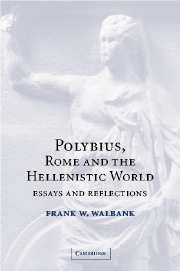Book contents
- Frontmatter
- Contents
- Preface
- Acknowledgements
- List of abbreviations
- 1 Polybian studies, c. 1975–2000
- HISTORICAL AND GEOGRAPHICAL PAPERS
- POLYBIUS AS A HISTORIAN
- 11 Timaeus' views on the past
- 12 Polybius and the past
- 13 The idea of decline in Polybius
- 14 Polybius' perception of the one and the many
- 15 Profit or amusement: some thoughts on the motives of Hellenistic historians
- POLYBIUS ON ROME
- TRANSMISSION OF POLYBIUS
- Bibliography
- Indexes
14 - Polybius' perception of the one and the many
Published online by Cambridge University Press: 22 September 2009
- Frontmatter
- Contents
- Preface
- Acknowledgements
- List of abbreviations
- 1 Polybian studies, c. 1975–2000
- HISTORICAL AND GEOGRAPHICAL PAPERS
- POLYBIUS AS A HISTORIAN
- 11 Timaeus' views on the past
- 12 Polybius and the past
- 13 The idea of decline in Polybius
- 14 Polybius' perception of the one and the many
- 15 Profit or amusement: some thoughts on the motives of Hellenistic historians
- POLYBIUS ON ROME
- TRANSMISSION OF POLYBIUS
- Bibliography
- Indexes
Summary
‘Leaders and masses’ has been chosen as a suitable theme around which to organise a celebration of the author of Plebs and Princeps. Zvi Yavetz's work deals primarily with the age of Caesar and the early empire. But what happened then was largely the outcome of developments in Roman public life in the second century, during which Rome achieved predominance in the Mediterranean world. Our guide to that earlier period is Polybius' Histories and as my contribution to this volume I propose to examine Polybius' perception of leaders and masses, the one and the many, and the rôle he saw each fulfilling in the Greece where he was brought up and then in the Rome with which he became familiar as an exile and as a historian. It will, I think, emerge that he saw these two opposites as basic elements in the political process which he was concerned to analyse.
‘The many’ is a phrase which at once conjures up the notion of ‘democracy’. But the meaning of the word ‘democracy’, δημοκρατία, in Hellenistic Greece has been the subject of controversy over the last fifty years. In an important article published in 1945, J. A. O. Larsen argued that in the Hellenistic period the words ‘democracy’ and ‘democratic’ were used loosely as the virtual equivalent of ‘self-governing’ and that any contrast implied in their use was not, as formerly, with ‘oligarchic’, but rather with the idea of domination by an outside ruler.
- Type
- Chapter
- Information
- Polybius, Rome and the Hellenistic WorldEssays and Reflections, pp. 212 - 230Publisher: Cambridge University PressPrint publication year: 2002
- 1
- Cited by



